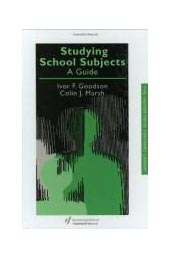Studying School Subjects: a guide
Conclusions, Complexities and Conjectures
The evidence indicates not so much domination by dominant forces as solicitous surrender by subordinate groups. Far from teacher socialisation in dominant institutions being the major factor creating the patterns discerned it was much more considerations of teachers' material self-interest in their working lives. Since the misconception is purveyed by sociologists who exhort us 'to understand the teacher's real world', they should really know better. High-status knowledge gains its school subject adherents and aspirants less through the control of the curricula which socialise than through well-established connection with patterns of resource allocation and the associated work and career prospects these ensure. The studies in this book argue that we must replace crude notions of domination with patterns of control in which subordinate groups can be seen actively at work.
But if domination by the universities fails to characterise a complex process correctly, the activities of 'academic' subgroups in school subjects clearly do conspire to increase the control over the definition and direction of subjects by university scholars. The conflict then focuses on the alliance between the universities and the academic school subject groups and those other subject traditions, notably the pedagogic and utilitarian, which often express internal school needs. In this continuing contest the academic tradition holds all the cards. Reid contended that within schools a
major area of conflict is... between the external constraints arising from university requirements and the internal pressures which have their origin in the school. Schools are, however, poorly equipped to resist university pressures. To a large extent they allow the legitimacy of university demands, and have evolved an authority structure which is linked to them…They are, by contrast much better placed to deal with internal demands, and have a variety of means at their disposal for clamping down pressures which conflict with the responses stimulated by university influence[i].
The existence of academic, pedagogic and utilitarian traditions in school curricula has its origins in the separate sectors of the educational system which preceded the comprehensive era. The continuance of these traditions and the continuing dominance of the academic tradition bear testimony that the fundamental structures of curriculum have withstood comprehensive reorganisation. As in the tripartite system so in the comprehensive system, academic subjects for able pupils are accorded the highest status and resources. The triple alliance between academic subjects, academic examinations and able pupils ensures that comprehensive schools provide similar patterns of curriculum differentiation to previous school systems. For the teachers who have to cater for all kinds of pupils this concentration on a particular kind of pupil and a particular kind of educational success poses the same dilemma voiced by the rural studies teacher in response to the promotion of academic examinations in his subject: 'Once again we can see the unwanted children of lower intelligence being made servants of the juggernaut of documented evidence, the inflated examination.' This conclusion summarises the continuing choice:
True education is not for every man the scrap of paper he leaves school with. Dare we as teachers admit this? Dare we risk our existence by forcibly expressing our views on this? While we pause after the first phase of our acceptance are we to rely on exams for all to prove ourselves worthy of the kindly eye of the state?[ii]
[i] W.A. Reid, 'Sixth Form', p. 106.
[ii] 'P.L. Quant, See Chapter 6, p. 163.
